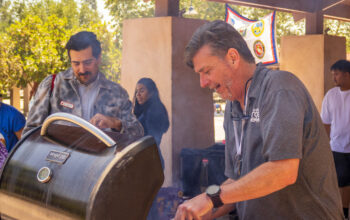Television producer Jeff Schultz took the road less traveled when he stopped pursuing higher education to search for his calling in life. Now, he has more than 30 years of media experience to share with students.
The Speaker Series’ second guest was Schultz, who’s worked in the media industry. Of those years, 20 of them were spent with the same broadcasting company KTTV.
Schultz said that he has never received a college degree, but encouraged students to earn one for themselves.
“You should get a degree,” Schultz said. “A degree is a good thing, it’s a fantastic thing, it will only make you a better person. Not having a college degree has made my path to where I am today, such as it is, just a little more difficult and a little more alternative.”
He moved across the country bouncing from one job to another trying to find his passion in life.
“There was really fat on the land that you could live off of,” Schultz said. “You could throw caution to the wind. I’m not saying that you can’t anymore, but I’m just saying, I imagine it’s much, much tougher to do.”
For a while Schultz worked at Universal Studios as a secretary, typing up movie scripts and legal documents. A friend of his invited him to help generate graphics for KTLA.
When he got into the media business in 1982, it was not under union regulations and he was able to work his way up the social ladder.
“This was a non-union job at the time,” Schultz said. “KTLA is different now, but this made all the difference for me in terms of me getting my foot into the door of the business.”
He became a producer and worked in a handful of cities across the country including: Tucson, Nashville, and Atlanta. He used this as an example for students to encourage other locations when searching for work.
“Even though there has been a horrendous shrinkage in terms of jobs and opportunities, and is the main theme of what I’m talking about today,” Schultz said. “There is still TV news and it’s not going away anytime soon.”
Schultz also talked about the massive change the internet brought to the industry, making many jobs redundant.
“Nothing in your life, or our lives, or the lives of the world has been such a paradigm shift as the advent of the internet. It is the equivalent of the industrial revolution,” Schultz said.
Whole floors and departments of workers at Fox, and other news stations all over the country were laid off when their jobs became unnecessary, said Schultz.
“A real shrinkage, in part of corporate greed, and in part of progress, quite frankly. You have to come up with a creative alternative to continue in the business,” Schultz said.
According to Schultz, social media is the new way of receiving news because of its quick response time. This rapid output of information leaves late night news shows behind the cutting edge stories as their time block keep them hours away from breaking lead stories.
This shift has also made viewers much more vital to the process of collecting and delivering the news as the separation between world events and the audience has diminished with the growth of social media.
“The idea of passive viewing has gone out the window, there are no more passive viewers. Viewers are active, they don’t just absorb, they put out, they react, and sometimes they react in astonishingly angry and nasty ways,” Schultz said.
He spoke of the ways in which an individual can now gather an audience by themselves and get a job through recognition, bypassing the union, almost in the same way as he did in the early 80’s.
The system of job acquisition almost coming full circle. But Schultz also warned of the dangers of social media bringing up the death of Christina Grimmie.
Grimmie was a YouTube sensation who was starting to break into the mainstream before she was shot and killed by an obsessive fan.
“It’s sort of like live or die by social media,” Schultz said.
Schultz ended the speech by talking about how rewarding and satisfying a career in news reporting can be.
“Journalists have a front row seat to history, and the fact that you are able to observe and watch history every day from the front lines, and how thrilling that can be,”adjunct professor of journalism Tracie Savage said.
Students in attendance listened to Schultz provide advice on how to get into the media industry.
“I thought his take on the media was interesting, especially relating to Fox. I just enjoyed seeing how most of that stuff works,” auto service technology major Seth Hercules said.




